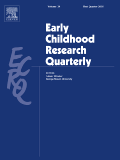From the abstract: "The following prospective longitudinal study used an epidemiological sample (N = 1236) to consider the potential mediating role of early cumulative household chaos (6–58 months) in associations between early family income poverty (6 months) and children’s academic achievement in kindergarten. Two dimensions of household chaos, disorganization and instability, were examined as mediators. Results revealed that, in the presence of household disorganization (but not instability) and relevant covariates, income poverty was no longer directly related to academic achievement. Income poverty was, however, positively related to household disorganization, which was, in turn, associated with lower academic achievement. Study results are consistent with previous research indicating that household chaos conveys some of the adverse longitudinal effects of income poverty on children’s outcomes and extend previous findings specifically to academic achievement in early childhood..."
2016
Garrett-Peters, P. T., Mokrova, I., Vernon-Feagans, L., Willoughby, M., Pan, Y., & the Family Life Project Key Investigators. (2016). The role of household chaos in understanding relations between early poverty and children's academic achievement. Early Childhood Research Quarterly, 37, 16-25.
10.1016/j.ecresq.2016.02.004

